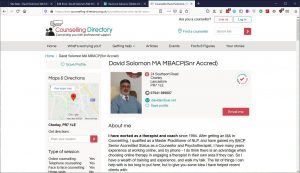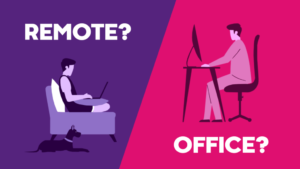Let me start with something that may surprise you:
 Online/telephone work is as effective as face-to-face, according to the research. Is online/telephone work just the same as face-to-face then? – it does have a different feel. It can move slower sometimes, or faster sometimes. It can feel more intense, or less intense, at different times. Some clients can talk about issues over the phone/video more easily than face to face, and for some it’s the other way around. So, the feel is different, but it works just as well for most people.
Online/telephone work is as effective as face-to-face, according to the research. Is online/telephone work just the same as face-to-face then? – it does have a different feel. It can move slower sometimes, or faster sometimes. It can feel more intense, or less intense, at different times. Some clients can talk about issues over the phone/video more easily than face to face, and for some it’s the other way around. So, the feel is different, but it works just as well for most people.
Most clients are pleasantly surprised at how well online and telephone counselling works for them, actually. To be honest, I have always preferred working face to face (although I started my counselling life as a telephone volunteer), and I prefer using video conferencing to a phone call – particularly now that smartphones can do everything. I have used all the methods for many years now, and I am well used to them.
The choice of a therapist is very difficult, because there are so many available. Of course  you will know that, whether you are looking for an online or face-to-face therapist it’s important to find a therapist that
you will know that, whether you are looking for an online or face-to-face therapist it’s important to find a therapist that
- you get on with
- you can come to feel comfortable and relaxed with
- who is competent and professional.
So how do you choose from the tens of thousands available?
 Firstly, I do think that the best way to begin is to search professional directories for therapists in your own area. Why your own area? Your circumstances may change, and it’s then possible to move to face-to-face work if you want to, without having to start again with someone new. So I suspect we would use online or telephone counselling during the times when we can’t meet in person – say if we think we might be infectious. I am open to creative solutions too – for instance I have had clients sit in their cars in front of my window, and talk on the phone to me while we nod to each other (fortunately my driveway is suitable for this).
Firstly, I do think that the best way to begin is to search professional directories for therapists in your own area. Why your own area? Your circumstances may change, and it’s then possible to move to face-to-face work if you want to, without having to start again with someone new. So I suspect we would use online or telephone counselling during the times when we can’t meet in person – say if we think we might be infectious. I am open to creative solutions too – for instance I have had clients sit in their cars in front of my window, and talk on the phone to me while we nod to each other (fortunately my driveway is suitable for this).
Another advantage of working with someone in your area is that it is easier to make a connection with someone who has some shared experience with you – living in the same country is a good start! It can be a little difficult, for instance, having a deep conversation with another English speaking person from a different country, as the meanings of words, and the organisations of society are subtly different.
Using a professional directory means that the work of checking the therapist is qualified and experienced has already been done for you. For instance, I have chosen to advertise on the BACP website (my professional body), Counselling-Directory (I like their layout), and the BUPA Providers online website. (Spoiler alert, they all say the same thing, more or less – which is no bad thing).
Coming to feel a real connection when talking with your therapist is the number one predictor that your therapy will be successful.  That comes as a surprise to most people, who think that face to face therapy must be better than the alternatives, or that one type of therapy must be intrinsically better than another.
That comes as a surprise to most people, who think that face to face therapy must be better than the alternatives, or that one type of therapy must be intrinsically better than another.
Of course, when you are working online, some of that feeling comfortable and relaxed is down to you – a comfy quiet chair, privacy, a cup of tea, and decent phone or internet reception.
I think I can get a “feel” for a particular therapist by reading their website, however my wife would always want to speak to someone before making up her mind. It’s important that you find your own way. In my own practice, I find I get on very well with most people (surprise, surprise, I suspect that’s true of all good therapists, and anyone who is genuinely interested in hearing what the other person has to say), and very few clients have come to me since 1995 and just not got on with me. I don’t do trial sessions as such, but if a private client doesn’t want to continue after the first session, I refund all money received and am pleased to do it, – and as I say, it’s maybe happens once or twice a year. Take a look at the First Appointment page (link) if you need more details on that.



 Online/telephone work is as effective as face-to-face, according to the research. Is online/telephone work just the same as face-to-face then? – it does have a different feel. It can move slower sometimes, or faster sometimes. It can feel more intense, or less intense, at different times. Some clients can talk about issues over the phone/video more easily than face to face, and for some it’s the other way around. So, the feel is different, but it works just as well for most people.
Online/telephone work is as effective as face-to-face, according to the research. Is online/telephone work just the same as face-to-face then? – it does have a different feel. It can move slower sometimes, or faster sometimes. It can feel more intense, or less intense, at different times. Some clients can talk about issues over the phone/video more easily than face to face, and for some it’s the other way around. So, the feel is different, but it works just as well for most people. you will know that, whether you are looking for an online or face-to-face therapist it’s important to find a therapist that
you will know that, whether you are looking for an online or face-to-face therapist it’s important to find a therapist that Firstly, I do think that the best way to begin is to search professional directories for therapists in your own area. Why your own area? Your circumstances may change, and it’s then possible to move to face-to-face work if you want to, without having to start again with someone new. So I suspect we would use online or telephone counselling during the times when we can’t meet in person – say if we think we might be infectious. I am open to creative solutions too – for instance I have had clients sit in their cars in front of my window, and talk on the phone to me while we nod to each other (fortunately my driveway is suitable for this).
Firstly, I do think that the best way to begin is to search professional directories for therapists in your own area. Why your own area? Your circumstances may change, and it’s then possible to move to face-to-face work if you want to, without having to start again with someone new. So I suspect we would use online or telephone counselling during the times when we can’t meet in person – say if we think we might be infectious. I am open to creative solutions too – for instance I have had clients sit in their cars in front of my window, and talk on the phone to me while we nod to each other (fortunately my driveway is suitable for this). That comes as a surprise to most people, who think that face to face therapy must be better than the alternatives, or that one type of therapy must be intrinsically better than another.
That comes as a surprise to most people, who think that face to face therapy must be better than the alternatives, or that one type of therapy must be intrinsically better than another. Firstly, I was questioned as to whether private therapy was good value compared to the NHS – “The NHS has got to be doing it cheaper, hasn’t it!” was what was said to me. And there certainly wasn’t a question mark at the end of her sentence.
Firstly, I was questioned as to whether private therapy was good value compared to the NHS – “The NHS has got to be doing it cheaper, hasn’t it!” was what was said to me. And there certainly wasn’t a question mark at the end of her sentence.

 If you have been a client and want one of these leaflets, or have had a leaflet and want to update it, contact me. I’m keeping up-to-date versions on dropbox, and I’ll send you the link to your leaflet.
If you have been a client and want one of these leaflets, or have had a leaflet and want to update it, contact me. I’m keeping up-to-date versions on dropbox, and I’ll send you the link to your leaflet. Received wisdom is that every website should have a blog. Mine contains (see on the right under “From David’s Blog):
Received wisdom is that every website should have a blog. Mine contains (see on the right under “From David’s Blog): My sister is waiting to see if she has bipolar disorder, and it is affecting our whole family. Would a few therapy sessions with you help while we wait for an NHS appointment for her? (You did not leave me an email address so I am replying to your questions here, having changed some of the details).
My sister is waiting to see if she has bipolar disorder, and it is affecting our whole family. Would a few therapy sessions with you help while we wait for an NHS appointment for her? (You did not leave me an email address so I am replying to your questions here, having changed some of the details).